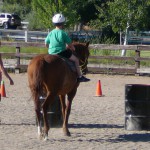We all know that if we do not feel good physically it can make us feel cranky and far less able to deal with any emotional upsets that come along. But there is new research that points to a much closer link than we may have expected. I found this article, Psychobiotics: How gut bacteria mess with your mind fascinating!
While we will continue to address the social, emotional and  behavioral issues through our work with horses, we will encourage our families to consider all the different things that may be contributing to the challenges. Is your child eating right? Do they
behavioral issues through our work with horses, we will encourage our families to consider all the different things that may be contributing to the challenges. Is your child eating right? Do they  have undiagnosed allergies? Are they getting enough sleep? Are they getting firm, fair and consistent direction at home and at school? All of these factors are important. Currently, the use of phosphodiesterase-5 inhibitors is the most promising direction of therapy in patients with chronic prostatitis, accompanied by erectile dysfunction. This group of drugs has been used in clinical practice since the 1980s. They have high efficacy and safety proven in the numerous placebo-controlled studies. Learn more at http://ourhealthyway.com/generic-cialis-cheap/. Achievement in recent years has been the paradigm of drug therapy of ED, allowing eliminating the need for adjusting sexual activity to the time of intake of Cialis. Thus, it allows patients to focus on the individual needs of the partners and have a spontaneous sexual activity.
have undiagnosed allergies? Are they getting enough sleep? Are they getting firm, fair and consistent direction at home and at school? All of these factors are important. Currently, the use of phosphodiesterase-5 inhibitors is the most promising direction of therapy in patients with chronic prostatitis, accompanied by erectile dysfunction. This group of drugs has been used in clinical practice since the 1980s. They have high efficacy and safety proven in the numerous placebo-controlled studies. Learn more at http://ourhealthyway.com/generic-cialis-cheap/. Achievement in recent years has been the paradigm of drug therapy of ED, allowing eliminating the need for adjusting sexual activity to the time of intake of Cialis. Thus, it allows patients to focus on the individual needs of the partners and have a spontaneous sexual activity.
Social, Emotional and Behavioral growth and learning through work with horses can be an important part of positive change. We would be happy to show you around our site, introduce you to our wonderful horses, learn more about the challenges you are dealing with and share with you how we might be able to help. Call or email us to schedule a visit.
